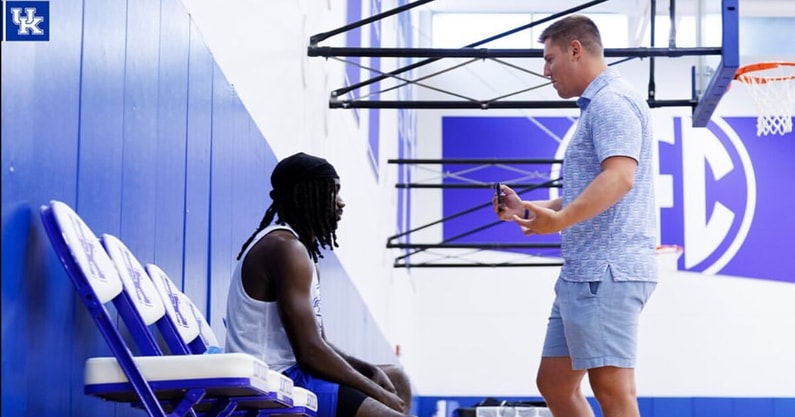A Silence Finally Broken: One Former Wildcat Revisits the Exit That Shook Big Blue—and What Might Have Changed Everything
When Kahlil Whitney arrived in Lexington as a five-star recruit and McDonald’s All-American, expectations soared. Dubbed “The Dragon” for his explosive athleticism and charisma, Whitney was seen as the next dynamic wing to thrive under John Calipari’s system at Kentucky—a program known for turning raw talent into NBA-ready stardom.
But his story took a sharp and unexpected turn.
Midway through the 2019–20 season, Whitney announced he was leaving the program. No transfer portal. No reassignment. Just an abrupt exit that stunned Big Blue Nation and left fans—and Whitney himself—with more questions than answers.
Now, nearly five years later, Whitney is finally ready to talk. In a heartfelt and candid interview, he opens up about the mental toll of that season, what could have convinced him to stay, and why making peace with Kentucky is something he considers essential to his growth as both a player and a person.
“I Wasn’t Ready… But I Didn’t Know That Then”
Speaking publicly for the first time in-depth about his departure, Whitney admits that the pressure, hype, and personal expectations became overwhelming.
“I came in thinking I had to prove everything right away,” he said. “I didn’t take the time to slow down, learn, and adjust. When things didn’t go the way I expected, I shut down.”
Averaging just 3.3 points per game in limited minutes, Whitney struggled to find his rhythm in a crowded rotation. As his confidence wavered, frustration set in—not just with the game, but with himself.
“It wasn’t Kentucky’s fault,” Whitney clarified. “Coach Cal believed in me. The staff did. The fans did. I just didn’t believe in myself the way I needed to.”
What Could Have Kept Him in Lexington
When asked what, if anything, could have kept him at Kentucky longer, Whitney reflected on the importance of mentorship and mental health resources.
“If I’d spoken up earlier—really talked to someone about how I was feeling—I think I would’ve stayed,” he said. “But I didn’t want to be seen as weak. I was 18, proud, and scared all at once.”
Whitney also acknowledged that the team’s competitive depth made it tough to break through, but not impossible. Players like Immanuel Quickley and Tyrese Maxey were thriving, not because they were favored, he said, but because they adapted.
“Looking back, I wish I had stayed and fought for it.”
Making Things Right with Big Blue Nation
Now playing professionally and with a few seasons of growth and perspective under his belt, Whitney says reconnecting with Kentucky isn’t about reopening old wounds—it’s about healing.
“I love BBN. I felt the love even when I left, and that meant everything. But I know I disappointed people. I want to show them I’m still growing—and still grateful.”
Whitney has reportedly reached out to former coaches and even fans via social media, sharing positive messages and encouraging current players to embrace their Kentucky journey.
He also expressed interest in returning to Rupp Arena one day—not to play, but to say thank you.
A Lesson for the Next Generation
Kahlil Whitney’s story is now part of a growing conversation around athlete mental health, the pressures of early stardom, and the difficult decisions young players must face.
“If my story helps even one player speak up, stay patient, or give themselves grace, then I’m proud of that,” Whitney said. “Kentucky taught me a lot—even if I had to leave to really learn it.”
The Bigger Picture
In a landscape where college athletes are often judged only by their stats or draft status, Whitney’s journey is a reminder of the human side of sports. It’s not just about the ones who stay and succeed—it’s also about those who leave, learn, and still find a way forward.
Big Blue Nation may have lost a player that season, but it’s gained a deeper understanding of the complexity behind a young man’s choice. And now, with his silence broken, Whitney’s voice may echo even louder than his dunk ever did.





















